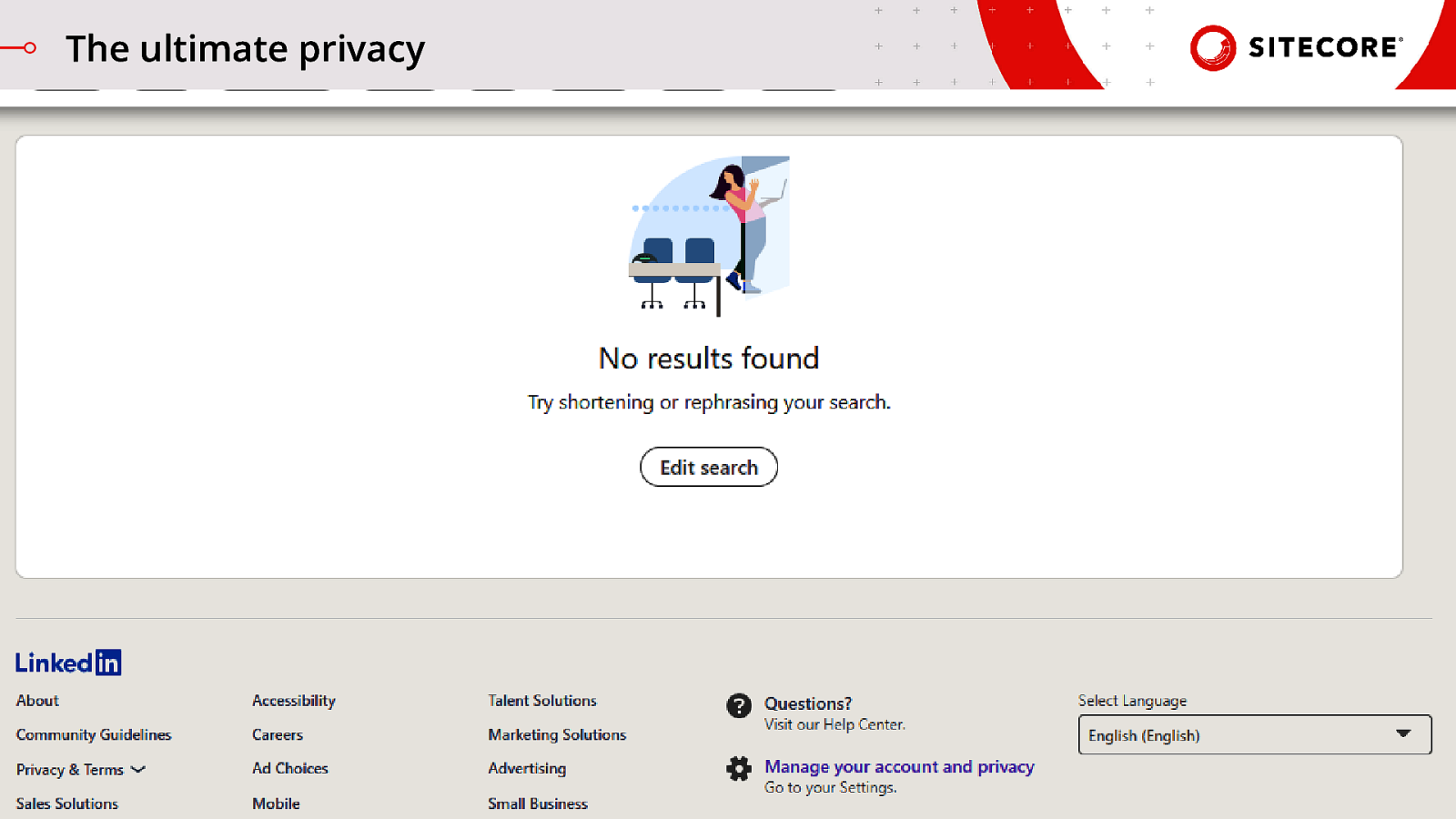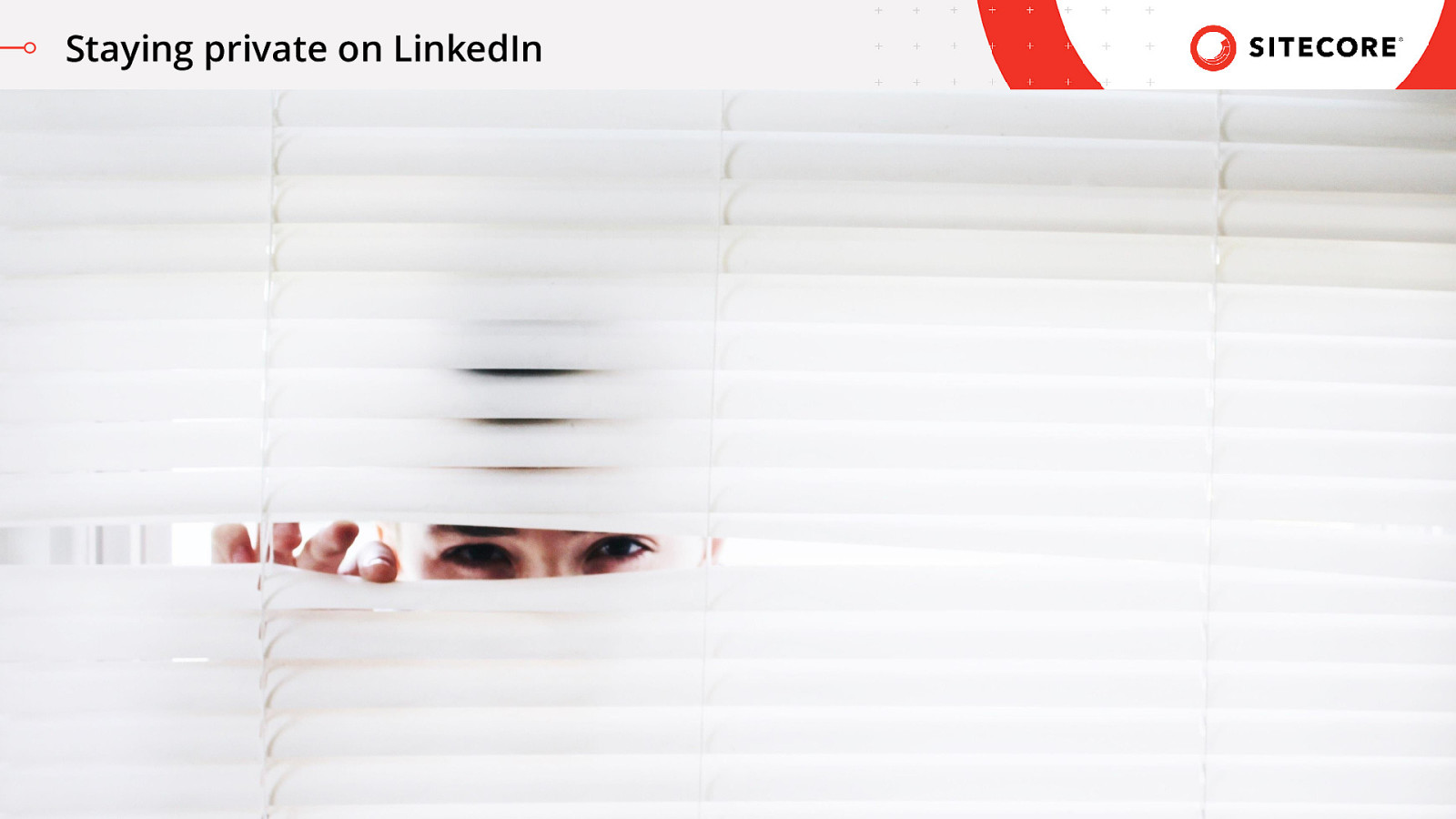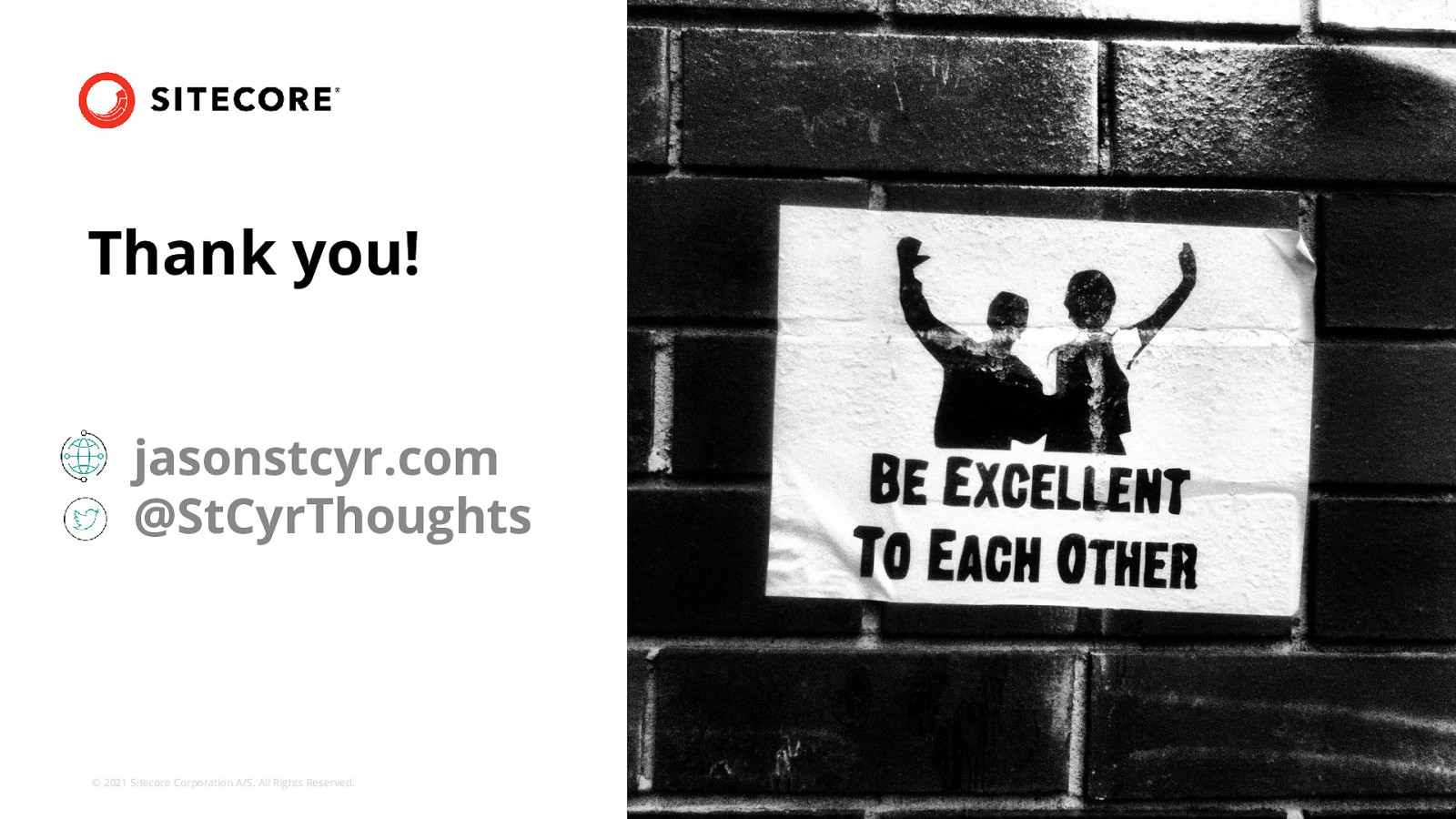Hiding in Plain Sight: Leveraging Social Media While Protecting Your Privacy
A presentation at Incubator 13 Webinar - April 21st in in Ottawa, ON, Canada by Jason St-Cyr

Hiding in plain sight - Leveraging social media while protecting your privacy.
One of the tricky parts of building out a professional social presence is how to do so and be comfortable with how much you are sharing about yourself. How do we balance being vulnerable, honest, and real so that we can build up a professional persona, but still protect our private identities.

Hello there!
My name I Jason, and I want to share some of the things that I’ve tried to do to create more of an online presence for myself professionally, without giving away all the personal details of my life.
In my role at Sitecore, I act as a sort of public face for the company with our technical audience. So I’m heavily active out there, constantly trying to share things and connect with people. I try to share what I can about myself, but in a recent Twitter outreach I did, almost nobody was able to say anything about my personal life when trying to describe me.
When is my birthday? What are my middle names? What is my wife’s name? How many kids do I have? What do they look like? Where do I shop or eat? What type of vehicle do I drive?
My professional profiles seem like they are sharing a lot, and they tease at these details, but it takes a lot of digging to try to find these things, and some of them can’t be found at all online.

The social dilemma
So today, we’ll talk through the basics of the benefits of building out that social brand, as well as the benefits of protecting your privacy, and ultimately look at how do we balance both of these.
To close things off, I’d like to show some specific details about LinkedIn and steps you can take on that specific platform, since it’s used by a lot of folks for doing professional social media.

Why leverage social?
So let’s set some of the benefits up for why you should leverage social media for your professional self. Not everybody wants to do this, and even I didn’t start in on building this out until later in my career as I started to take on a more external persona.

Building a brand: The 'professional' self
The primary benefit is to create a brand. This means having a representation of yourself that you show off to the rest of the world. Brands can be small, they can be huge, the goal here is not to have the biggest brand (unless that is what you are trying to do) but to have an accurate brand so that when people interview you or work with you, that it seems like a logical extension of what they have already experienced.
One of the first things you need to know about building out your professional brand is that it doesn’t have to be “professional” in the way you might think. There are a lot of successful individuals whose public personas have nothing to do with the work they do, they don’t even necessarily sanitize how they speak online or what they share.
Ultimately, it’ about creating a persona that somebody wants to connect with. It’s your digital business card and as long as you are comfortable with what is there being the first impression somebody has before meeting you, then it’s all good.
As an example, when I go into a big meeting with people I don’t know, I visit as many of the profiles as I can on LinkedIn to get an idea of who I’m meeting with. What type of role they have, get a general idea of experience level, maybe what interests them if I have the time. If I’m interviewing somebody, I’ll dig a little deeper into their work history and what activity they are sharing, and see if they have any linked identities like a Twitter or a website. So this combination of online presences provides somebody else a view into who you are, and you get to control that and build that out.
There’s a social media influencer, Tamara McCleary, who has stated that you want think about what the three adjectives are that somebody would say about you, behind your back. And then think about that when you are building out your platform. You can choose those three adjectives, and then start building that out purposefully.

The audience is there for you
Social media in particular provides an easy way to reach an audience. There are numerous ways and tools to leverage to build out your brand, and you should use them, but with social media you can tap into existing communities and audiences that are actively looking to connect with others.
In my own case, I wasn’t trying to build out the largest audience possible. I’ve been trying to create a pretty closed network of followers as part of a community around the software that we build. I have either met, or interacted with, in some way most of the people who follow me. There are obviously exceptions as some of my content and messages has permeated out into the social sphere, but for the most part I’ve tried to avoid “playing the follower game” and connected into existing communities.
I participated in the community, I connected with other folks who were also active, I used hashtags used by that community. It grew slowly, but I now have a pretty loyal audience that has stuck through some pretty awful dad puns and music recommendations.

Choice of platforms that can fit you
Now, when I first started doing this, I didn’t know where I should be. I had a LinkedIn profile, and a personal Facebook account, but neither was very active. I was mostly in forums and Q&A boards like Stackoverflow.
Then I discovered Twitter and some very sarcastic folks that amused me. For me, Twitter became a fit. Later, I created a corporate Facebook persona for a few cross-posts, and I try to get some activity on LinkedIn, but I decided that Twitter would be my brand account. That is where I would create the ‘me’ that people should follow.
This is a great benefit of social media for brand building. There are a variety of platforms available, and they cater to different types of audiences and communities. I hate to quote the old “the medium is the message” thing, but part of your brand is actually the platform you choose.
- TikTok is fun and positive
- Twitter is more sarcastic
- LinkedIn feels like a corporate networking event And there are lots of others.
Think about your audience, the way you like to create, and how you want to connect. Choose a platform that feels right. You might have to try them out to see how it feels.

Support building your "network"
One of the best reasons to start using social media to build your brand is the opportunity to connect for open positions/job opportunities. You can build up connections with people over time, and they’ll already know you before you even start your interview. This can be a huge benefit to you in some cases.
This also allows you to break through the “old boys network” that has been created in a lot of industries. The physical boundaries of office life created a lot of closed networks for professionals, making it hard to break into these networks. Social media can help break out of this pattern by offering another way for people to connect beyond those physical connections people make.

Why privacy?
However, while we’re out in the world building out these brands, we also need to recognize that there are a lot of benefits to staying private.
For example, a lot of the stories I can tell of my experience are also framed by the fact that I have a relatively privileged life experience as a middle-aged, white, straight male. I can do things like share my photo, without even thinking that this might impact somebody else’s impression of me. So there are benefits to keeping some things hidden.

Separate personal from professional
When looking through a privacy-first lens, one of the things you can do is separate your professional life from your personal life. This makes it easier to create a consistent brand, especially when your personal life is very different from your professional life. Some folks prefer to create a single “whole view of a person” and others try to keep one account for their family pics and connecting with friends, and another alt for their corporate persona.

Protecting your identity
Another benefit of going privacy-first is the protection of your identity. Any steps you can take to reduce the amount of private information put into a social account makes it harder for you to be the victim of an identity or DOXX attack.

Limit information sharing across linked entities
Another benefit to taking a privacy angle is about keeping control of your data. If you put it into a social media site, you can almost guarantee it’s being shared with somebody else, and that platform may not be disclosing to you where that data is going. More recent efforts around privacy laws have helped address this and make it easier to control, but the best control is keeping the data out of there.

Protect future self from present self
Another thing to consider about taking a privacy-first approach is looking towards the future. You can’t know what yourself from 10 or 15 years down the road is going to need. The more you put out there, the more risk you take on. What you do here does depend on how much risk tolerance you have. The more private you are, the less risk.

Physical safety of you and your family
Outside of digital safety and identity theft, there is also real-world physical safety that you need to be concerned about. Applying a privacy-first lens on your social media usage can make sure people don’t find out where you live, where your kids go to school, when are you away from your house regularly.

Hiding in plain site
Okay… so there’s a benefit to be loud and build a brand and also a bunch of benefits to taking a privacy-first mindset… so what are some things we can do to balance those?

Things to share
- On the open front, share about yourself, what you feel, what you like. Builds up appearance that you are open
- For your professional brand, using your real name is helpful and allows your network to find you, but you probably want to protect your family information (wife/kids names)
- You might also travel for work and want to share things about where you are and what you’re doing. This is a tough one… you don’t necessarily want to be sharing that you’re away from home, but if you are going to present at a conference in Italy, maybe that’s something you want your network to know you do? I would say that if it’s a professional trip that would augment your perceived professional value, you probably want to use that and create a bit of buzz around yourself.
On alt accounts Earlier I mentioned that a privacy-first approach would separate your professional from personal life. An “alt” is a good way to make sure that potential employers, colleagues, etc. have a harder time finding out about your friends, family, and fun photos of that time you were in a band. To make this harder to tie the two together, you’ll likely have to keep your ‘personal’ account with an alternate nickname, or first name only, and have a profile picture that doesn’t immediately identify you as the same person so that folks searching for you don’t accidentally stumble upon your alt. Just note that every time you make it harder to find you, you are making it harder to find you. So that person that you went to high school with a decade ago is not going to be able to randomly reach out and friend you on Facebook, you’ll need to make those connections or have folks find you via one of your connections.

Things to keep locked down
There are also numerous things you should probably make sure you are locking down. There are a lot of options to go through, but here are some big ones to look at:
- Birth dates: It’s REALLY popular to put your birthday in on social media sites and then you get a nice Happy Birthday message from all your friends, and usually the social platform itself. However, this is an easy one to use a fake value for and you can usually hide it from others even if the system requires it on your profile.
- Personal data like maiden names, addresses, home phone numbers that might be tied to a physical address. There is rarely a need for any of this stuff in your social profile.
- Avoid mentioning location-specific things like a specific restaurant, grocery store, gym… anything that could be used to find out where you live. You might take a selfie at a restaurant, or at the gym, and if you can make it look pretty generic so it can’t be figured out, you can have a little extra privacy while still sharing something you like.
- Avoid mentioning regular times of day you are out of the house or at a specific location. Unless you want people to come to where you live or where you are going, this is a good practice to keep your physical location private.
- Related to that, is your device location. If you have some sort of “ghost mode” on apps, or you can disable your phone location, this is an easy way to start limiting the amount of information you share. For example, if you have device location on, a lot of phones are automatically setup to tag the photos you take with the location where you took the photo using GPS. Turning this type of stuff off, and not using apps that broadcast your current location to followers, is a general way of increasing the protection of your physical privacy.

Things to consider
Ultimately, this is a “it depends” type of scenario where you need to find out what works for you. There are some questions you can ask yourself as you start doing this. - What are you trying to do with your social presence? - Landing a job, growing your network, creating a following
- Are you going to go with a public or private social approach?
- Total lockdown, prevents from using it as a ‘business card’, but allows you to participate in the social platform in a controlled way.
- Are you a brand ambassador?
- What is your brand? What do you want your employer to see? There may be things you’ll start feeling uncomfortable sharing once you start representing your company professionally.

LinkedIn - the Facebook for work
For the last part of this presentation I want to take a look at one example of leveraging social for your professional career: LinkedIn. While I personally decided to do the majority of my social on Twitter, I do also use LinkedIn in a limited capacity to create a network, apply for jobs, share job positions to my network, etc. I don’t share much about myself as a person there, but I try to be regularly active there and engage with others.
We’re going to look at some of the things you can specifically do on LinkedIn to help balance your brand building and privacy.

The ultimate privacy
- Some professionals choose privacy over the brand opportunities they can get with their social profile
- Making sure you do NOT have a LinkedIn profile will ultimately keep your data and activity at the highest level of privacy: it doesn’t exist
- This makes job hunting/networking more inconvenient, and makes being a ‘public figure’ of a company almost impossible. However, for many positions this is definitely a viable option that keeps your data out of LinkedIn databases and others.

Staying private on LinkedIn
On the privacy side of things, there are some things you can do to use LinkedIn without giving away much about yourself. Something that isn’t a setting, is your social behaviour. Try to have regular activity, not only when you are job hunting.
This doesn’t have to be everyday, but some people are only active on LinkedIn when they are job seeking. By having regular activity, you demonstrate some amount of involvement in your industry, but also make it more difficult to know when you are in ‘job hunt’ mode. Sometimes, the best security is obfuscation: make it so hard to find out by simply overloading with regular activity.
- First, in Contact Info, do not provide your phone or birthday. You can have a phone number for password reset without having it in your Contact Info
- Private mode: You can enable ‘Private mode’ which will allow you to view people without them seeing you. If you want people to know you are viewing them, don’t use this, obviously. Side effect: You won’t see people who are looking at your profile. It’s an “opt-in to networking” option (unless you upgrade to premium).
- Hide your email: Most people allow connections to see their email address. You can change this so that your primary email is only visible to yourself and is not included in data exports.
- Last name: You can also choose to hide your last name and only display the first initial of your last name. You still come back on a search, but people seeing you on Linked cannot find out what your last name is without connecting to you. This is a personal decision to make here… I make my name part of my brand so it works for me to expose it to a wider audience. Definitely more protected to prevent identity theft or other things by choosing to hide the last name from people who are not connections.
- Profile visibility off LinkedIn: There are connected platforms that can pull data from LinkedIn and show them in their sites/apps… things like Outlook. Turning this off can help minimize the number of places your data can be spread.
- Activity visibility on LinkedIn: Most of the activity visibility is pretty harmless. If you do something, somebody can see you did something. Key ones to turn off are usually your “Active status” (so nobody knows when you are using LinkedIn) and “Share profile updates”. This allows you to tweak your LinkedIn profile without making people think you are actively job hunting.
- Public Profile: You can control what people who are not logged into LinkedIn can see about your work experience. Things you can choose to disable:
- Profile Photo
- Specific elements of your portfolio
- Details about your current or past experiences
- Suggestion: Use the “if it’s public, make it public” rule.

Helpful boosters that others sometimes miss
Let’s talk about brand building and boosting. There are a few easy things you can do that really help your profile be a better portfolio or business card to your network.
- About section: This is like a cover letter, but usually shorter and less formal. This allows you to capture a bit of yourself in written form and highlight it first in front of your audience.
- Featured section: This is a great way to highlight a bit of a portfolio, especially if you have articles posted
- Experience: Most people list their jobs and what they did. If there’s a way to rewrite to highlight applicable skills for your next job that you want, this is a great place to do it.
- Experience Portfolio: For individual jobs, you can add links to items, allowing for folks to see your work related to a given position. You don’t need this for every position, but if you can do anything that will display rich media, it’s a great way to add some visuals to your profile. I use presentations that I’ve recently delivered for my most recent position. NOTE: Just a note that this will display differently on your public profile. The portfolio items will not show, even if you have details on for that position on your public profile.

Thank you!
Buzz and feedback
Here’s what was said about this presentation on social media.
-
Free webinar alert!
— incubator13 Ottawa (@Incubator13O) April 8, 2021
Link below for more info:https://t.co/nDk9IE7yJi@RBC @YSB @RRCRCincubator13 @cityofottawa @OttawaCommunityFoundation#ottawa #protectyourself #613 #onlineprivacy #buildyourbusiness #socialmedia #RBC #YSB #incubator13 #cityofottawa #success pic.twitter.com/fDA1oAeysP -
Hey folks, I'm presenting later this week as part of @Incubator13O regular career events. There are limited spots, so check out the EventBrite link in the quoted tweet to register! https://t.co/rZYro15jG9
— Jason St-Cyr (@StCyrThoughts) April 19, 2021 -
Reminder: This is this afternoon!!
— incubator13 Ottawa (@Incubator13O) April 21, 2021
See link below:https://t.co/nDk9IE7yJi@RBC @YSB @RRCRCincubator13 @cityofottawa @OttawaCommunityFoundation#ottawa #protectyourself #613 #onlineprivacy #buildyourbusiness #socialmedia #RBC #YSB #incubator13 #cityofottawa #success pic.twitter.com/HUHLkbHfx5
